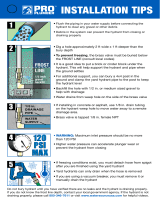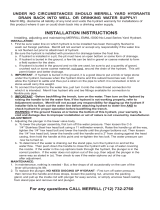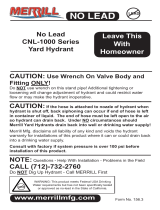
For more information contact…
WOODFORD MANUFACTURING COMPANY
2121 Waynoka Road, Colorado Springs, Colorado 80915 • Phone: (800) 621-6032 • Fax: (800) 765-4115
To view our complete product line visit: www.woodfordmfg.com
A Division of WCM Industries, Inc.
W34
Rev 05/10 Form No. IIYH.102
These instructions do not apply to Sanitary Hydrants or
Utility Hydrants.
1. Dig hole for hydrant approximately 2 feet in
diameter and deeper than the bury depth.
2. Flush gravel, debris, etc. out of the supply line
before connecting hydrant.
3. Install hydrant with drain hole below frost line.
Use wrenches on supply line fitting and brass
valve body only. This avoids over tightening the
hydrant assembly which could affect operation.
4. If supply line to the hydrant will not support
hydrant, use re-bar, length of pipe or other
suitable support driven in bottom of pit to help
support hydrant. Before filling excavation, turn
on water and check hydrant connection for
leaks.
5. Provisions must be made to allow the water to
drain from the hydrant drain hole each time the
hydrant is closed.
a) Fill bottom of pit with 1/2" gravel to a
minimum of 3" above brass drain valve
body, to insure adequate drainage.
b) If the hydrant is installed inside a structure
or concrete driveway, connect copper drain
tubing to the 1/8" NPT drain hole and dig a
remote drain field outside the structure for
the drain pipe to empty into. Without this
remote piping drain field, the water from the
hydrant drainage may percolate up to the
surface around or near the hydrant and will
damage the floor surface or cause muddy
areas around hydrant.
c) Saturated ground in the hydrant drain field
can prevent the hydrant from fully draining
and may result in freezing. If the area
where the hydrant is located is low lying or
has a tendency to have standing water, a
larger drain field or pit may be required to
provide the hydrant a place to drain.
34
34 & Y1
R34












